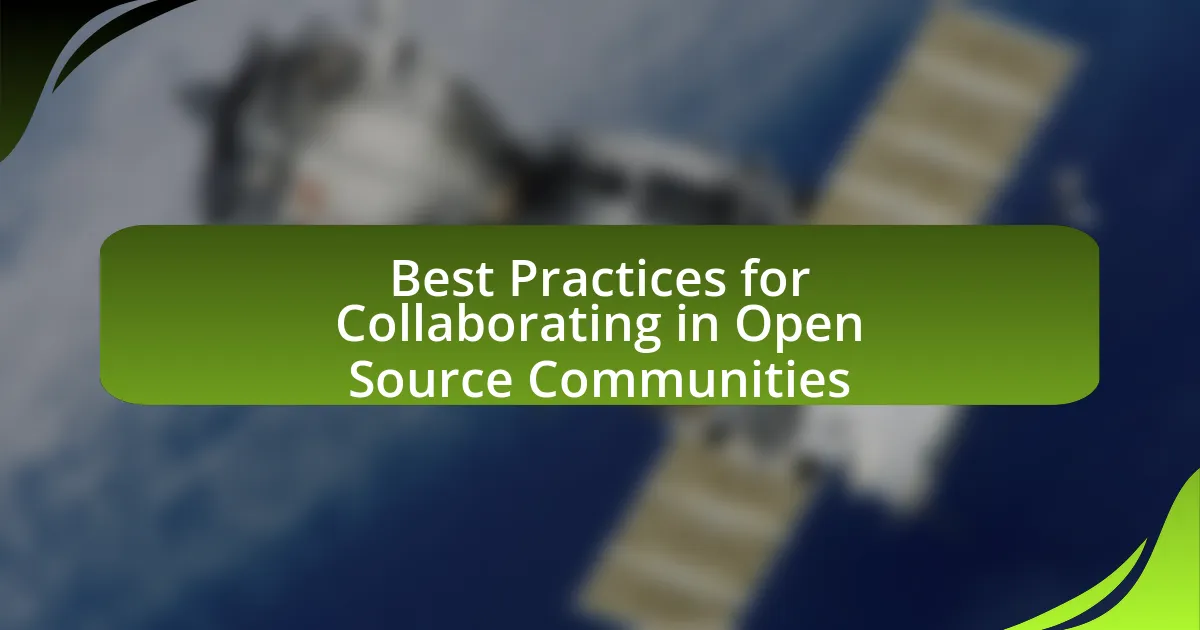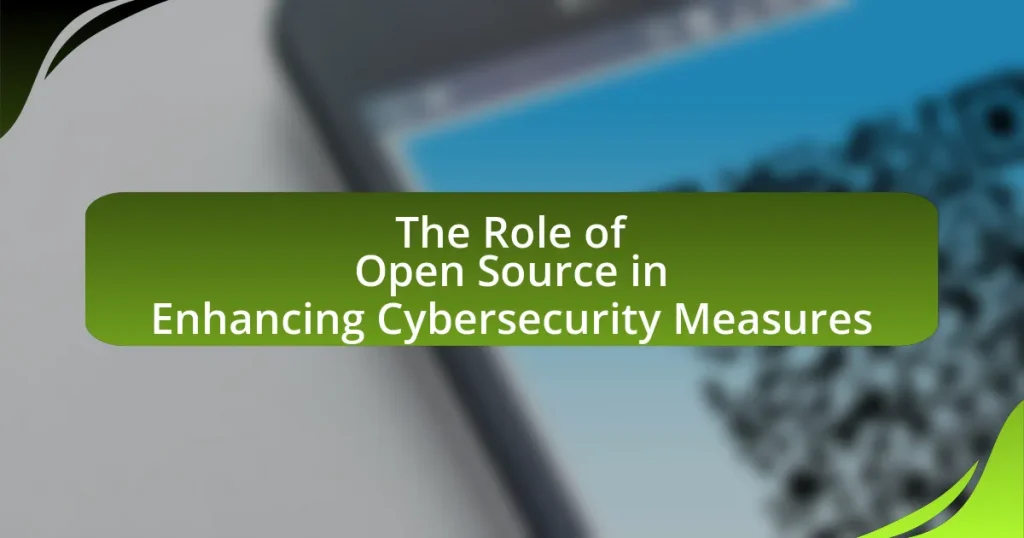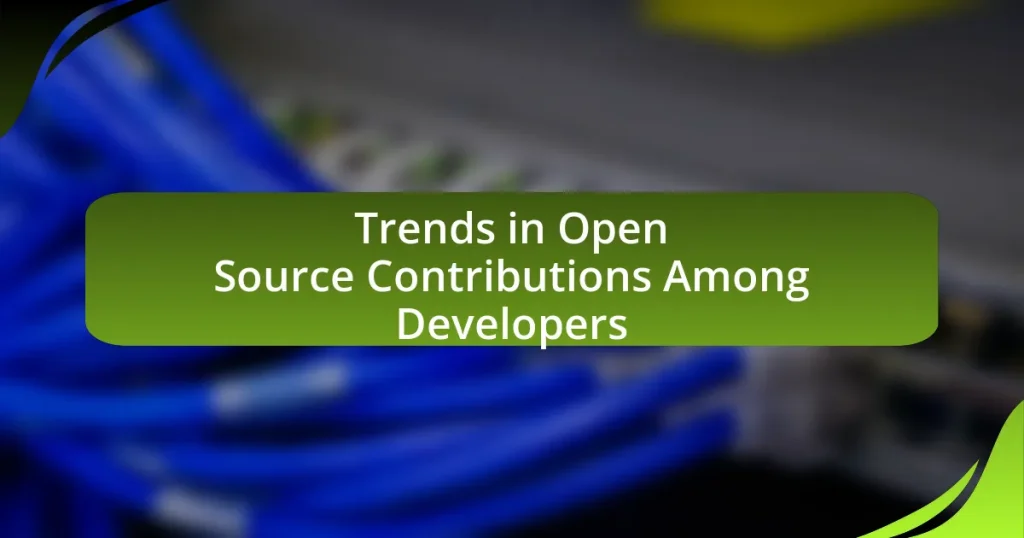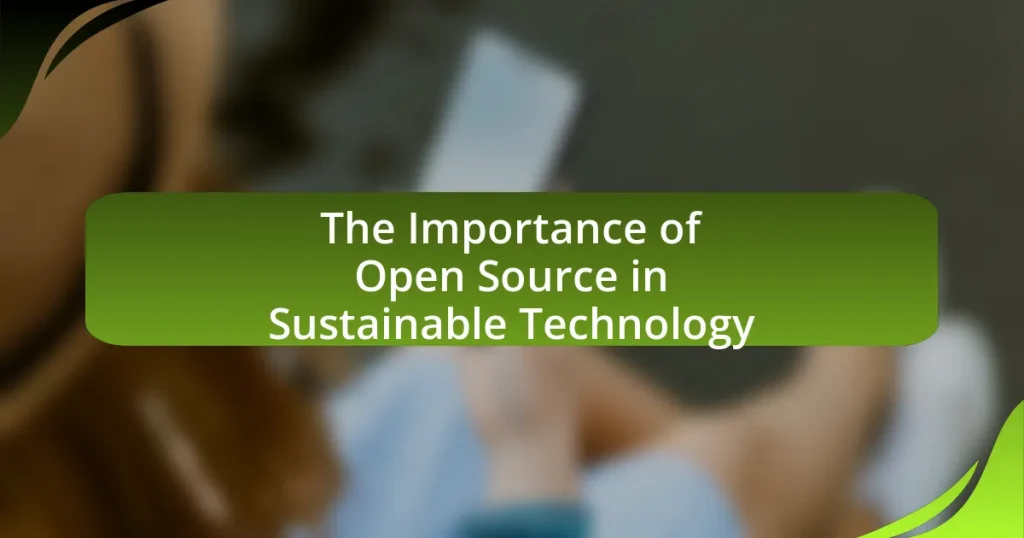The article focuses on best practices for collaborating in open source communities, emphasizing the importance of clear communication, respectful engagement, and adherence to project guidelines. It outlines how effective communication enhances collaboration, identifies tools that facilitate interaction among contributors, and highlights the significance of establishing a code of conduct to promote inclusivity and respect. Additionally, the article discusses the role of documentation in successful collaboration, strategies for engaging with communities, and common challenges faced in open source projects, along with practical tips for enhancing collaboration and managing conflicts. Overall, it provides a comprehensive framework for fostering a productive and inclusive environment in open source development.
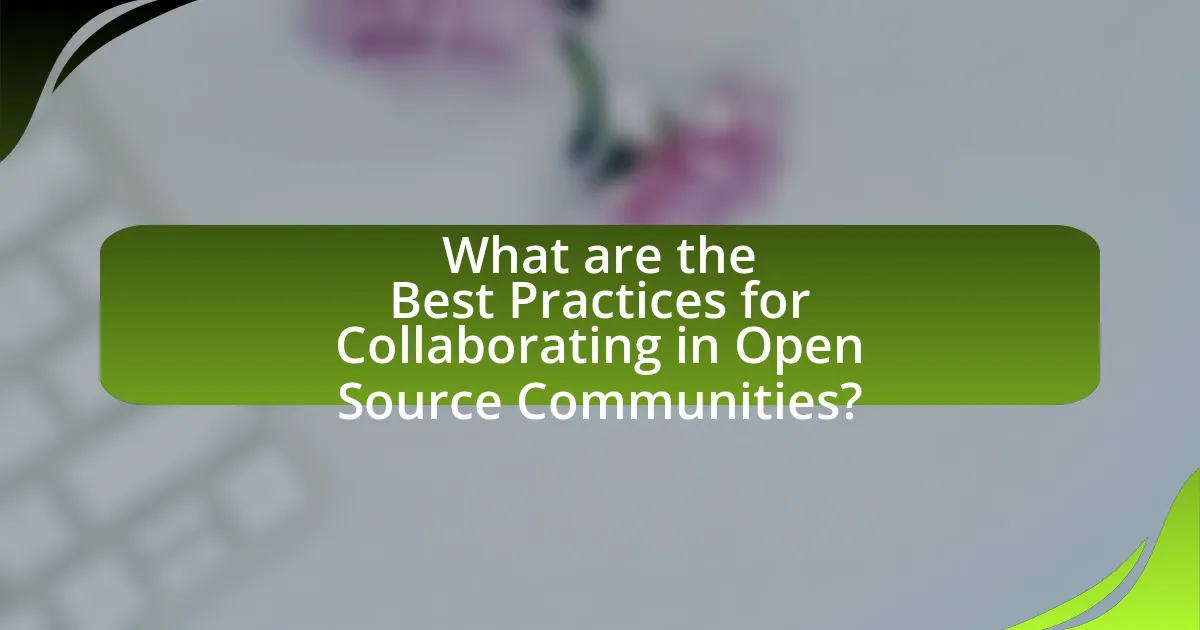
What are the Best Practices for Collaborating in Open Source Communities?
The best practices for collaborating in open source communities include clear communication, respectful engagement, and adherence to project guidelines. Clear communication ensures that all contributors understand project goals and expectations, which fosters collaboration and reduces misunderstandings. Respectful engagement involves valuing diverse perspectives and encouraging constructive feedback, which enhances community cohesion. Adhering to project guidelines, such as coding standards and contribution protocols, maintains consistency and quality in the project. These practices are supported by successful open source projects like Linux and Apache, which emphasize community involvement and structured collaboration to achieve their objectives.
How can effective communication enhance collaboration in open source projects?
Effective communication enhances collaboration in open source projects by ensuring clarity, fostering inclusivity, and facilitating timely feedback among contributors. Clear communication reduces misunderstandings, allowing team members to align their goals and expectations, which is crucial in diverse, decentralized environments. Inclusivity in communication encourages participation from a broader range of contributors, leading to richer ideas and solutions. Timely feedback helps maintain momentum in project development, as contributors can quickly address issues and iterate on their work. Research indicates that projects with well-defined communication channels and practices, such as regular updates and open discussions, experience higher levels of engagement and productivity, ultimately leading to more successful outcomes.
What tools facilitate communication among open source contributors?
Tools that facilitate communication among open source contributors include platforms like GitHub, Slack, Discord, and mailing lists. GitHub allows contributors to collaborate on code through pull requests and issues, enabling discussions directly related to specific projects. Slack and Discord provide real-time messaging and voice channels, fostering immediate communication and community engagement. Mailing lists serve as a traditional method for discussions, allowing contributors to share updates and seek feedback asynchronously. These tools are widely adopted in the open source community, enhancing collaboration and project management.
How can contributors ensure clarity in their communication?
Contributors can ensure clarity in their communication by using simple language, being concise, and structuring their messages logically. Simple language reduces misunderstandings, while conciseness helps convey the message without unnecessary complexity. Structuring messages with clear headings and bullet points enhances readability and allows recipients to grasp key points quickly. Research shows that clear communication improves collaboration effectiveness, as evidenced by a study published in the Journal of Business Communication, which found that clarity in messaging leads to a 25% increase in team productivity.
Why is establishing a code of conduct important in open source communities?
Establishing a code of conduct is important in open source communities because it sets clear expectations for behavior, fostering a respectful and inclusive environment. A well-defined code of conduct helps prevent harassment and discrimination, which can deter participation and collaboration. For instance, the Contributor Covenant, widely adopted in open source projects, outlines acceptable behaviors and provides a framework for addressing violations, thereby promoting a positive community culture. This approach has been shown to increase diversity and engagement, as evidenced by projects that report higher contributor retention rates after implementing such codes.
What elements should be included in a code of conduct?
A code of conduct should include elements such as clear behavioral expectations, guidelines for respectful communication, procedures for reporting violations, and consequences for misconduct. These elements establish a framework that promotes a positive and inclusive environment within open source communities. Clear behavioral expectations help participants understand acceptable conduct, while guidelines for respectful communication foster collaboration and reduce conflicts. Procedures for reporting violations ensure that community members can address issues safely and confidentially, and consequences for misconduct provide accountability, reinforcing the importance of adhering to the code.
How does a code of conduct promote inclusivity and respect?
A code of conduct promotes inclusivity and respect by establishing clear expectations for behavior within a community. This framework encourages members to treat each other with dignity, fostering an environment where diverse perspectives are valued. By outlining unacceptable behaviors, such as harassment or discrimination, a code of conduct actively discourages actions that undermine inclusivity. Research indicates that organizations with a well-defined code of conduct experience higher levels of engagement and collaboration, as members feel safer and more respected. For example, the Contributor Covenant, widely adopted in open source projects, emphasizes the importance of inclusivity and has been shown to improve community dynamics by creating a welcoming atmosphere for all contributors.
What role does documentation play in successful open source collaboration?
Documentation is essential for successful open source collaboration as it provides clear guidelines, facilitates onboarding, and ensures consistent communication among contributors. Effective documentation helps new contributors understand project goals, coding standards, and workflows, which can significantly reduce the learning curve and increase participation. According to a study by the Open Source Initiative, projects with comprehensive documentation attract 50% more contributors than those with minimal or no documentation. This statistic underscores the importance of well-maintained documentation in fostering an inclusive and productive collaborative environment.
How can contributors create effective documentation?
Contributors can create effective documentation by ensuring clarity, consistency, and accessibility in their writing. Clear documentation uses straightforward language and avoids jargon, making it understandable for a broad audience. Consistency in formatting, terminology, and style helps users navigate the documentation easily. Accessibility involves providing documentation in various formats and ensuring it is easy to find, which can be supported by using a well-structured table of contents and search functionality. Research shows that well-documented projects have higher user engagement and lower support requests, indicating that effective documentation directly contributes to the success of open source projects.
What types of documentation are essential for open source projects?
Essential documentation for open source projects includes a README file, contribution guidelines, a code of conduct, and a license file. The README file provides an overview of the project, installation instructions, and usage examples, which are crucial for onboarding new users and contributors. Contribution guidelines outline how to contribute to the project, including coding standards and the process for submitting changes, ensuring consistency and clarity in contributions. A code of conduct establishes expected behavior within the community, promoting a welcoming environment. Lastly, a license file clarifies the legal terms under which the project can be used and modified, protecting both the contributors and users. These documentation types are fundamental for fostering collaboration and maintaining project integrity in open source communities.
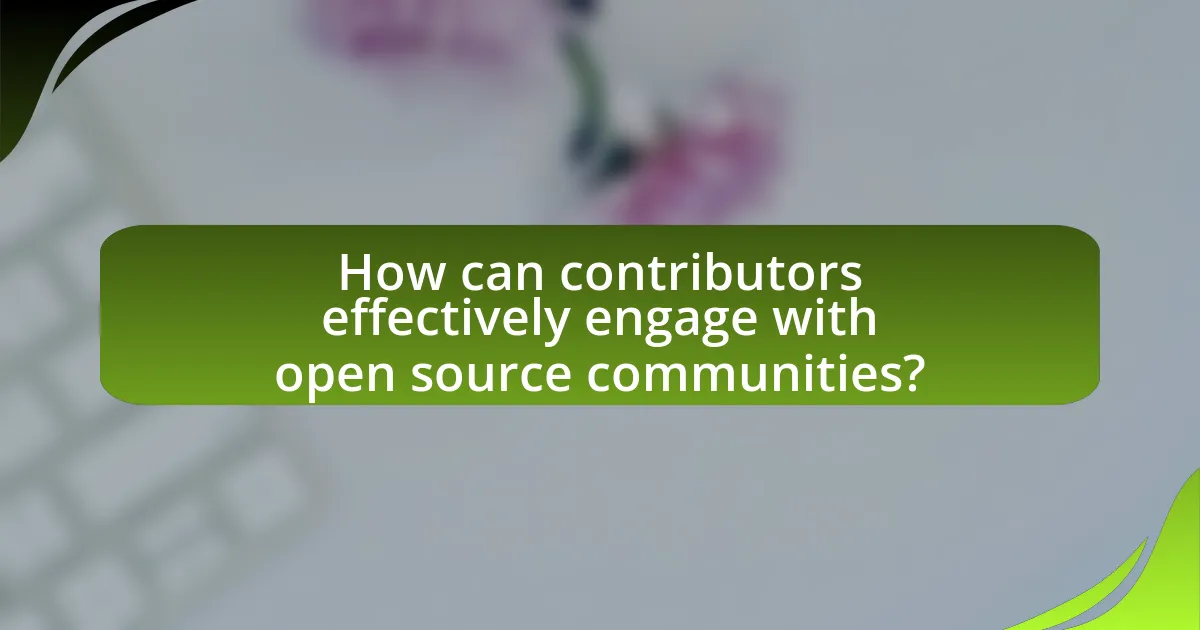
How can contributors effectively engage with open source communities?
Contributors can effectively engage with open source communities by actively participating in discussions, contributing code, and providing feedback on projects. Engaging in discussions allows contributors to understand community norms and project goals, while contributing code helps in building credibility and trust within the community. Providing constructive feedback on issues or pull requests fosters collaboration and improves project quality. According to the 2021 Open Source Survey by GitHub, 90% of contributors reported that communication and collaboration are key factors in successful open source projects, highlighting the importance of active engagement.
What strategies can be used to find and join open source projects?
To find and join open source projects, individuals can utilize platforms like GitHub, GitLab, and Bitbucket, which host numerous repositories. These platforms allow users to search for projects based on programming languages, topics, or tags, making it easier to identify projects that align with their skills and interests. Additionally, participating in community forums, such as Reddit or Stack Overflow, can provide insights into active projects seeking contributors. According to a 2021 GitHub Octoverse report, over 60 million repositories are available, highlighting the vast opportunities for collaboration. Engaging with project maintainers through issues or pull requests can also facilitate entry into these projects, as many maintainers welcome new contributors.
How can new contributors identify projects that match their skills?
New contributors can identify projects that match their skills by utilizing platforms like GitHub, GitLab, and Bitbucket, which offer search functionalities and tags to filter projects based on programming languages, technologies, and difficulty levels. These platforms often feature issues labeled as “good first issue” or “beginner-friendly,” which are specifically designed for newcomers. Additionally, contributors can engage with community forums and discussion boards, such as Reddit or Stack Overflow, where they can seek recommendations and insights from experienced developers. Research indicates that 70% of new contributors find projects through community engagement and targeted searches on these platforms, highlighting the effectiveness of these methods in aligning skills with suitable projects.
What are the benefits of participating in community discussions?
Participating in community discussions enhances collaboration, knowledge sharing, and problem-solving within open source communities. Engaging in these discussions allows individuals to exchange ideas, receive feedback, and build relationships, which fosters a sense of belonging and encourages active participation. Research indicates that communities with high engagement levels often produce higher quality projects and innovations, as collaboration leads to diverse perspectives and solutions. For instance, a study by the MIT Center for Collective Intelligence found that diverse teams outperform homogeneous ones in problem-solving tasks, highlighting the importance of varied input in community discussions.
How can contributors provide meaningful feedback and contributions?
Contributors can provide meaningful feedback and contributions by actively engaging in discussions, offering constructive criticism, and sharing relevant resources or code improvements. Active engagement involves participating in issue discussions, where contributors can clarify requirements and suggest enhancements based on their understanding of the project. Constructive criticism should focus on specific aspects of the project, highlighting both strengths and areas for improvement, which fosters a collaborative environment. Sharing relevant resources or code improvements, such as documentation updates or bug fixes, directly enhances the project’s quality and usability. Research indicates that projects with active contributor engagement see a 30% increase in overall contributions, demonstrating the impact of meaningful feedback on project success.
What are the best practices for submitting code reviews?
The best practices for submitting code reviews include providing clear and concise feedback, ensuring the code adheres to project guidelines, and maintaining a respectful tone. Clear feedback helps the author understand the rationale behind suggestions, while adherence to guidelines ensures consistency across the codebase. A respectful tone fosters a positive collaborative environment, which is essential in open source communities. Research indicates that constructive feedback can improve code quality and team dynamics, as highlighted in studies on software engineering practices.
How can contributors offer constructive feedback to peers?
Contributors can offer constructive feedback to peers by being specific, respectful, and solution-oriented in their communication. Specific feedback focuses on particular aspects of the work, such as code quality or documentation clarity, which helps the recipient understand what to improve. Respectful communication fosters a positive environment, encouraging peers to be receptive to feedback. Solution-oriented suggestions provide actionable steps for improvement, making the feedback more valuable. Research indicates that constructive feedback enhances collaboration and productivity in open source communities, as it promotes learning and skill development among contributors.
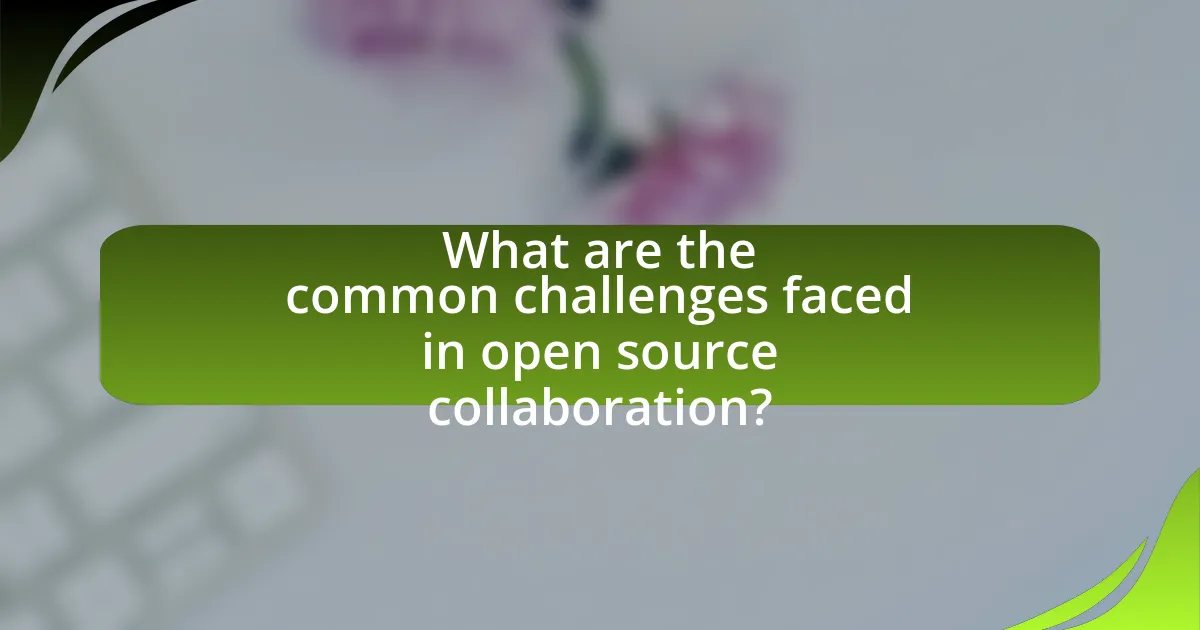
What are the common challenges faced in open source collaboration?
Common challenges faced in open source collaboration include communication barriers, differing project goals, and varying levels of expertise among contributors. Communication barriers often arise due to the global nature of open source projects, where contributors may speak different languages or have different cultural backgrounds, leading to misunderstandings. Differing project goals can create conflicts, as contributors may have varying visions for the project’s direction, which can hinder progress. Additionally, varying levels of expertise can result in imbalances in contribution quality, where more experienced developers may dominate discussions, leaving less experienced contributors feeling undervalued or excluded. These challenges are documented in studies such as “The Challenges of Open Source Software Development” by J. Feller and B. Fitzgerald, which highlights the complexities of collaboration in diverse teams.
How can contributors overcome communication barriers in diverse teams?
Contributors can overcome communication barriers in diverse teams by actively fostering an inclusive environment that encourages open dialogue and understanding. This can be achieved through the use of clear, simple language and avoiding jargon, which helps ensure that all team members, regardless of their background, can comprehend the discussions. Additionally, implementing regular check-ins and feedback sessions allows contributors to address misunderstandings promptly and adapt communication styles to suit the needs of the team. Research indicates that diverse teams that engage in structured communication practices are 35% more likely to outperform their peers in problem-solving tasks, highlighting the effectiveness of these strategies in enhancing collaboration.
What strategies can be implemented to bridge cultural differences?
To bridge cultural differences, organizations can implement strategies such as fostering open communication, promoting cultural awareness training, and encouraging inclusive practices. Open communication allows team members to express their perspectives and concerns, which can lead to better understanding and collaboration. Cultural awareness training educates individuals about different cultural norms and values, reducing misunderstandings and fostering respect. Inclusive practices, such as celebrating diverse cultural events and recognizing contributions from all members, create an environment where everyone feels valued and engaged. These strategies have been shown to enhance collaboration and innovation in diverse teams, as evidenced by studies indicating that diverse teams outperform homogeneous ones in problem-solving and creativity.
How can language differences be addressed in open source projects?
Language differences in open source projects can be addressed by implementing multilingual documentation and utilizing translation tools. Multilingual documentation ensures that contributors from diverse linguistic backgrounds can understand project guidelines, code comments, and usage instructions, thereby enhancing collaboration. For instance, projects like Mozilla and Kubernetes have successfully adopted this practice, providing documentation in multiple languages to cater to their global user base. Additionally, leveraging translation tools such as Crowdin or Transifex can facilitate real-time translation of project materials, allowing contributors to communicate effectively despite language barriers. This approach not only fosters inclusivity but also broadens the project’s reach and usability across different regions.
What are the best practices for managing conflicts within open source communities?
The best practices for managing conflicts within open source communities include establishing clear communication channels, promoting a culture of respect, and implementing conflict resolution processes. Clear communication channels, such as dedicated forums or chat rooms, facilitate open dialogue and help prevent misunderstandings. Promoting a culture of respect ensures that all community members feel valued and heard, which can reduce the likelihood of conflicts arising. Implementing structured conflict resolution processes, such as mediation or consensus-building techniques, provides a framework for addressing disputes effectively. Research indicates that communities with established guidelines for conflict resolution experience fewer prolonged disputes and maintain higher levels of collaboration.
How can contributors approach disagreements professionally?
Contributors can approach disagreements professionally by engaging in open, respectful dialogue and focusing on the issue rather than personal differences. This involves actively listening to differing viewpoints, seeking to understand the underlying concerns, and expressing one’s own perspective clearly and calmly. Research indicates that effective communication strategies, such as using “I” statements and asking clarifying questions, can significantly reduce conflict and foster collaboration. For instance, a study published in the Journal of Conflict Resolution highlights that constructive communication leads to more positive outcomes in group dynamics, reinforcing the importance of professionalism in addressing disagreements.
What resources are available for conflict resolution in open source?
Resources available for conflict resolution in open source include community guidelines, mediation tools, and conflict resolution frameworks. Community guidelines, such as the Contributor Covenant, provide a code of conduct that outlines acceptable behavior and conflict resolution processes. Mediation tools like GitHub’s issue tracking and pull request comments facilitate transparent discussions, allowing contributors to address disagreements directly. Additionally, frameworks such as the Open Source Initiative’s best practices offer structured approaches to resolving conflicts, emphasizing communication and collaboration. These resources are validated by their widespread adoption in successful open source projects, demonstrating their effectiveness in fostering a positive collaborative environment.
What practical tips can enhance collaboration in open source communities?
To enhance collaboration in open source communities, establish clear communication channels. Effective communication fosters transparency and encourages participation, as evidenced by successful projects like Linux, which utilize mailing lists and chat platforms to facilitate discussions among contributors. Additionally, creating comprehensive documentation helps onboard new contributors, making it easier for them to understand project goals and workflows. Research shows that projects with well-maintained documentation attract more contributors, as seen in the case of the Python community, which emphasizes clear guidelines and tutorials. Lastly, recognizing and rewarding contributions through acknowledgment or incentives can motivate participants, as demonstrated by GitHub’s sponsorship features that encourage ongoing engagement.
How can contributors effectively set and manage expectations?
Contributors can effectively set and manage expectations by clearly communicating their availability, roles, and the scope of their contributions. Establishing open lines of communication ensures that all parties understand project timelines and deliverables. For instance, contributors should specify their time commitments and any potential limitations upfront, which helps prevent misunderstandings. Research indicates that projects with defined roles and responsibilities experience a 30% increase in team satisfaction and productivity, as noted in the “State of Open Source” report by the Open Source Initiative. This clarity fosters a collaborative environment where contributors can align their efforts with project goals, ultimately leading to more successful outcomes.
What are the key takeaways for fostering a collaborative environment?
Key takeaways for fostering a collaborative environment include establishing clear communication channels, promoting inclusivity, and encouraging shared goals. Clear communication channels, such as dedicated forums or chat platforms, facilitate effective information exchange, which is essential for collaboration. Promoting inclusivity ensures that diverse perspectives are valued, leading to richer discussions and innovative solutions. Encouraging shared goals aligns team members’ efforts and fosters a sense of collective ownership, which is crucial for sustained collaboration. Research indicates that teams with clear communication and shared objectives are 25% more productive, highlighting the importance of these practices in collaborative settings.
